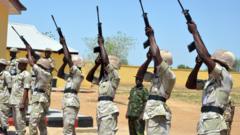The Nigerian military has confirmed it has killed 35 jihadists in a recent series of air strikes near the country’s north-eastern border with Cameroon. The strikes, which took place in four separate areas, were conducted to preemptively thwart potential attacks by jihadists on ground forces. Nigeria's battle against jihadist factions, characterized by persistent violence, kidnappings, and community-based conflicts, has spanned over a decade.
In a statement highlighting the severity of the situation, a coalition of prominent Nigerians, including former government officials, business leaders, and civil rights advocates, decried what they labeled "war-time levels of slaughter," despite the country remaining officially at peace. Their concerns come on the heels of an Amnesty International report citing over 10,000 deaths since President Bola Tinubu's administration began two years ago. The group urged the establishment of a Presidential Task Force endowed with robust powers to address the ongoing crises, which include the resurgence of Boko Haram and its splinter group, the Islamic State West Africa Province (ISWAP).
Last week, the military placed a substantial emphasis on their counter-terrorism and security operations, stating nearly 600 militants had been killed in the north-eastern region over the last eight months—though independent confirmation of this figure remains lacking. The Nigerian Air Force has pledged to sustain air support for ground troops, with a commitment to dismantle jihadist strongholds in the troubled region.
According to United Nations estimates, the prolonged conflict has claimed more than 35,000 lives and displaced around two million individuals. Earlier in the month, the U.S. government approved a weapon sale worth $346 million to bolster Nigeria’s efforts to maintain stability and quell unrest.
The Institute for Security Studies has reported at least 15 jihadist attacks so far this year along Nigeria’s borders with Cameroon and Niger, indicating a troubling trend. These groups have increasingly employed modified commercial drones to strike at military bases, effectively complicating the reinforcement of troops.
In conjunction with targeting jihadists, Nigeria’s military has also turned its focus on criminal gangs, colloquially referred to as "bandits," particularly in north-western Katsina state. This recent operation resulted in the rescue of 76 kidnapping victims, including women and children. However, the operation also reportedly led to the tragic death of a child during rescue operations.
The crisis in Katsina and neighboring Zamfara state has been particularly acute, with banditry leading to significant casualties and displacement of local communities. The threat of violence remains omnipresent, drawing urgent calls for effective intervention to restore safety and security for the inhabitants of Nigeria's affected regions.


















